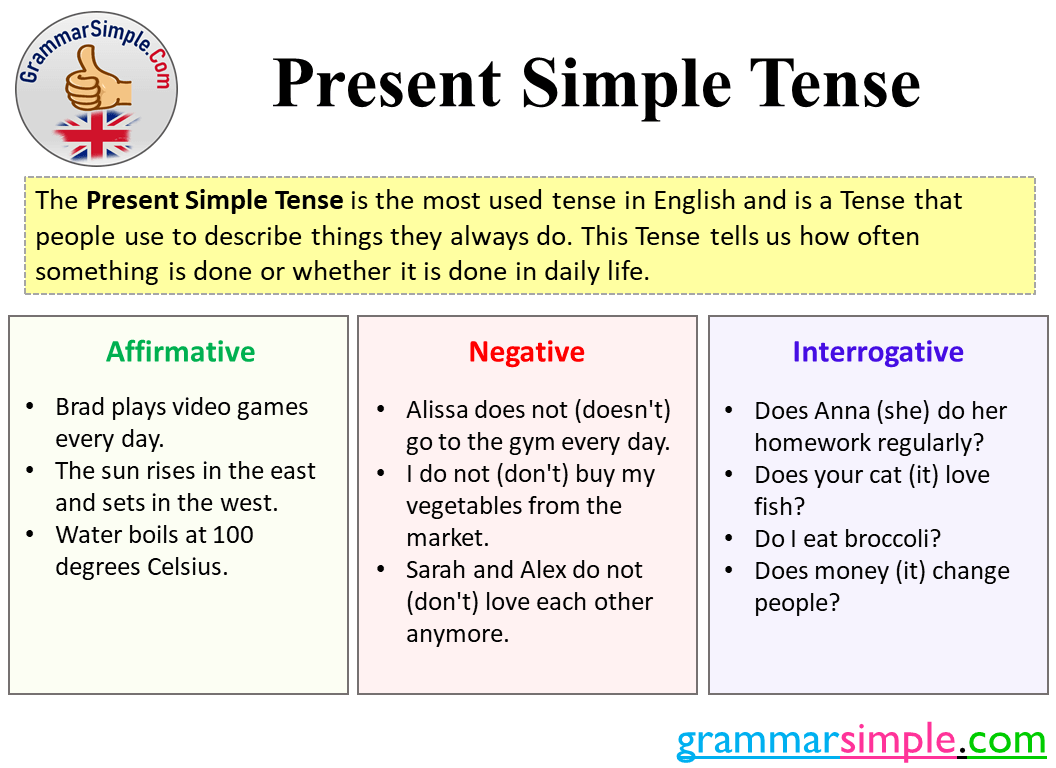Present Simple Tense Definition, Affirmative, Negative and Interrogative Sentences


Present Simple Tense Definition, Affirmative, Negative and Interrogative Sentences
Table of Contents
Present Simple Tense
The Present Simple Tense is the most used tense in English and is a Tense that people use to describe things they always do. This Tense tells us how often something is done or whether it is done in daily life. The Present Simple Tense, which is used for routine tasks that are done continuously and repeated every day, is also used for scientific facts. In addition, the Present Simple Tense is used when talking about events that are accepted by everyone and situations in which people agree.
How to Do the Present Simple Tense?
The Simple Present Tense, the first time taught in English, is also a pretty simple Tense for learning sentence sequences. In order to construct a sentence in English, you must first use the subject, then the predicate, and then the object. We can summarize the order of English sentences as subject-verb-object.
When you use he, she, and it in sentences using the Present Simple Tense, you must add -s to the verb. If you are going to make negative sentences, you need to use do not (don’t) in the subjects I, we, you, and they. For he, she, and it, you should use does not (doesn’t). The suffix “-s” used in the Present Simple Tense should not be used in negative sentences or questions.
Present Simple Tense Grammar Rules
Affirmative Sentences: When making affirmative sentences, it will be sufficient to simply add the verb for the I, You, We, They subjects and make the sentence order correctly. When you use He, She, and It subjects, you must add the -s suffix to the verb, then you can arrange the sentence as you wish, following the rules.
- Johnny and Angel have fun together.
- Brad plays video games every day.
- The sun rises in the east and sets in the west.
- Water boils at 100 degrees Celsius.
Negative Sentences: To make a negative sentence with I, You, We, They subjects, you should add the auxiliary verb do not (don’t) before the first form of the verb. This auxiliary verb does not (don’t) when you use the subjects He, She, and It. After using the auxiliary verb and using the main verb without the suffix, arrange the sentence according to the rules.
- You do not (don’t) borrow money from me.
- Alissa does not (doesn’t) go to the gym every day.
- I do not (don’t) buy my vegetables from the market.
- Sarah and Alex do not (don’t) love each other anymore.
Interrogative Sentences: When constructing interrogative sentences, an auxiliary verb must precede the sentence, this auxiliary verb is the auxiliary verb Do or Does. When using the subjects I, You, We, and They, you should add the auxiliary verb Do at the beginning of the sentence, put the subject, then add the main verb. For He, She, and It subjects, you should add Does to the beginning of the sentence and apply the same sequence.
- Do Anna and Jack (they) wash their hair every day?
- Does Anna (she) do her homework regularly?
- Does your cat (it) love fish?
- Do I eat broccoli?
- Does money (it) change people?
Recent Posts
Use Rose in a Sentence, How to Use Rose with Example Sentences
Use Rose in a Sentence, How to Use Rose with Example Sentences
Use Yourself in a Sentence, How to Use Yourself with Example Sentences
Use Yourself in a Sentence, How to Use Yourself with Example Sentences
Use Picture in a Sentence, How to Use Picture with Example Sentences
Use Picture in a Sentence, How to Use Picture with Example Sentences
Use Claim in a Sentence, How to Use Claim with Example Sentences
Use Claim in a Sentence, How to Use Claim with Example Sentences
Use Treasure in a Sentence, How to Use Treasure with Example Sentences
Use Treasure in a Sentence, How to Use Treasure with Example Sentences
Use Raise in a Sentence, How to Use Raise with Example Sentences
Use Raise in a Sentence, How to Use Raise with Example Sentences